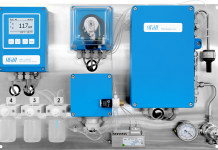Industrial gases company Air Products has brought onstream its four air separation unit (ASU) trains built for Shaanxi Future Energy Chemical Co., Ltd. in Yulin City, Shaanxi Province, China.
The project, capable of producing 12,000 tons per day of oxygen and significant tonnage volumes of nitrogen and compressed dry air for the customer’s coal chemical plant, represents one of the largest single on-site ASU orders ever committed to an industrial gas company. Phil Sproger, Air Products vice president, Asia On-Site Business Development, Industrial Gases, said: “The successful execution of this world-scale project is another testimonial of our leading position in large air separation and excellence in safety, reliability and technology. “We will continue to pursue opportunities where we can leverage on our application solutions and expertise to support China’s sustainable development under its 13th Five-year Plan.”
The industrial gases produced by Air Products’ ASUs and supplied to Shaanxi Future Energy Chemical at Yulin are used to help produce one million tons of high quality oil products annually. The four ASU trains are equipped with air compressors as well as design and technology advancements to enhance energy efficiency and minimize operational costs for the customer. Established in 2011, Shaanxi Future Energy Chemical is jointly-owned by the state-backed Yankuang Coal Group, Yanzhou Coal Co., Ltd. and Shaanxi Yanchang Petroleum Group.
Its Yulin coal-to-liquid demonstration project has been awarded ‘China’s Top 10 Project’ for the efforts on innovation and sustainability by China Petroleum & Chemical Industrial Federation, a non-profit organization covering more than 300 major companies, institutions and associations in China’s petrochemical industry, and China Chemical Industry News, the country’s leading trade publication. Dr. Sun Qiwen, general manager of Shaanxi Future Energy Chemical, said: “We are pleased to have partnered with Air Products on this important project and impressed with their technological and safety expertise demonstrated throughout the execution.”
Air Products has been operating in China since 1987 and has built several world-scale ASU facilities in the country, supplying large tonnage quantities of industrial gases to significant energy projects for customers including Weihe Clean Energy Co. and Pucheng Clean Energy Co. in Shaanxi Province. It is building another multi-train ASU project in Shanxi Province to support Shanxi Lu’an Mining Group’s coal-to-liquid business. Outside China, the company is now building the world’s largest industrial gas complex, capable of supplying 75,000 metric tons per day (20,000 oxygen and 55,000 nitrogen) to Saudi Aramco’s refinery being built in Jazan, Saudi Arabia. Key process equipment is designed by Air Products’ engineering and manufacturing team in Shanghai and will be manufactured in China.
Joining forces
BASF and the French biotechnology company CYTOO have joined forces to develop and test ingredients that contribute to increase skin firmness in skin care applications. Recent research results indicate that there are some ingredients that can stimulate the contractility of human fibroblasts, connective tissue cells, and improve skin appearance and firmness.
Drone ruling welcomed
The US. House Transportation & Infrastructure Committee has approved an amendment to the Aviation Innovation, Reform and Reauthorization Act that will restrict the unauthorised use of drones near chemical facilities and oil refineries. The American Chemistry Council welcomed the decision, saying: “The vote will help address a mounting security concern and help safeguard chemical facilities, which play a critical role in manufacturing products that are important to the everyday health and well-being of our nation.”
Fighting the wrinkles
Scientists have devised a method for making wrinkle-resistant cotton fabrics that are more environmentally-friendly and cost-effective than current versions. According to an American Chemical Society Journal, Yiqi Yang and his colleagues investigated chemicals that had resistant properties but did not require formaldehyde, a hazardous chemical used in existing processes. The best results were obtained by citric acid and xylitol. Citric acid is a mediocre anti-wrinkling agent and yellows fabrics but when linked with xylitol, discolouration is mitigated and anti-wrinkling improved. The researchers received funding from the Chinese National High Technology Research and Development Program and US Department of Agriculture.














